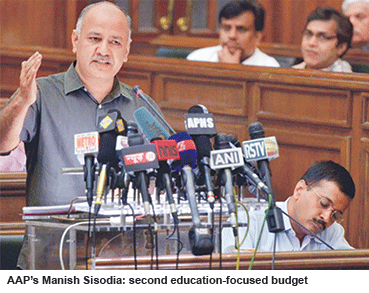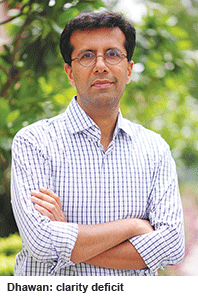 FOR THE SECOND YEAR in a row, the Aam Aadmi Party (AAP) government — which swept to power in the Delhi state legislative assembly last year routing the fancied BJP — tabled an education-focused Budget 2016-17 on March 29. Deputy chief minister Manish Sisodia, also the finance and education minister, announced an outlay of Rs.10,690 crore for education, equivalent to 23 percent of the Rs.46,000 crore annual budget for Delhi. “We are increasing the education budget every year, whereas the Central government, irrespective of the political party in power, has been decreasing the percentage of budget allocation for education every year,” said Sisodia, taking a dig at the BJP-led Central government. “As in 2015-16, the increase in budget for the education sector will improve the infrastructure of government schools.”
FOR THE SECOND YEAR in a row, the Aam Aadmi Party (AAP) government — which swept to power in the Delhi state legislative assembly last year routing the fancied BJP — tabled an education-focused Budget 2016-17 on March 29. Deputy chief minister Manish Sisodia, also the finance and education minister, announced an outlay of Rs.10,690 crore for education, equivalent to 23 percent of the Rs.46,000 crore annual budget for Delhi. “We are increasing the education budget every year, whereas the Central government, irrespective of the political party in power, has been decreasing the percentage of budget allocation for education every year,” said Sisodia, taking a dig at the BJP-led Central government. “As in 2015-16, the increase in budget for the education sector will improve the infrastructure of government schools.”
Although the education outlay for 2016-17 is 8.6 percent higher than last fiscal (Rs.9,836 crore) and the highest in the history of Delhi state, educationists and academics point out that adjusted for inflation, the proposed spending on education is not as impressive, and is an attempt to complete the projects the AAP government promised in its maiden budget last year. Of the 236 new schools promised to be promoted by the end of fiscal 2015-16, not even one is operational with a mere 25 under construction. Moreover, the 50 model schools announced by the government in last year’s budget, are yet to take shape. All Delhi government colleges were to be wi-fi enabled which still remains a promissory note.
“Lackadaisical project implementation and unspent funds from last year’s budget have raised questions about the AAP government’s execution capabilities. Moreover, the state government’s priorities are confusing with allocations being made for the same projects. Instead of building new schools, AAP should focus its attention on improving the quality of education delivered in its own government schools through teacher training and better learning outcomes. Clearly, the AAP government needs to improve its expenditure efficiency,” says Ambarish Rai, convenor of the Delhi-based RTE Forum, a network of 10,000 civil society groups working on effective implementation of the Right of Children to Free and Compulsory Education (RTE) Act, 2009.
Also, instead of minding its own schools, to curry favour with Delhi’s influential middle class, the AAP government’s education ministry has spent disproportionate time controlling and regulating Delhi’s 1,800 private unaided schools. For instance, it made several failed attempts to scrap management quotas of schools (the Delhi high court dismissed the order finding “no merit in the move”) and has also introduced two bills — The Delhi School (Verification of Accounts and Refund of Excess Fee) Bill, 2015 and Delhi School Education Act and Rules 1973 (Amendment) Bill, 2015 — to regulate fees, admissions and pay scales of teachers in private schools. These two bills are awaiting approval of the President who is advised by the Central government.
“With generous resources allocated for education, the AAP government needs to get its priorities right. Delhi needs more private schools and colleges. Therefore, instead of hindering them with ill-advised legislation, the state government should comprehensively improve teaching-learning delivered in its own schools. The Central government-promoted Navodaya Vidyalayas and Kendriya Vidyalayas are proven success stories and that’s the model the state government needs to emulate instead of harassing and discouraging private schools,” says S.K. Bhattacharya, president, Action Committee for Unaided Recognised Private Schools, an umbrella organisation of six associations of private schools in Delhi NCR (national capital region).
Clearly, the untested AAP leadership needs to learn that it’s not enough to make generous budgetary provision for education. Greater allocations need to be followed up with expenditure efficiency and time-bound project execution capability.
Swati Roy (Delhi)
Unintended consequences
Of the estimated 2.28 million seats reserved by law for children from poor neighbourhood households in elementary classes (I-VIII) of private unaided non-minority schools countrywide under s.12 (1) (c) of the Right of Children to Free and Compulsory Education (RTE) Act, 2009, only 346,108 were filled in the academic year 2014-15. This is the conclusion of the recently released State of the Nation: RTE S. 12 (1) (c) Report, researched and published by a collaborative alliance of the RTE Resource Centre of IIM-Ahmedabad, Central Square Foundation (CSF), Accountability Initiative (Centre for Policy Research) and Vidhi Centre for Legal Policy — all based in Delhi.
To compile its second annual report released in Delhi on March 10, the collaborative alliance accessed data available in public domain including websites and documents of state education ministries and the Union HRD ministry, District Information System for Education, media reports and information extracted from state governments. According to State of the Nation, the most s.12 (1) (c)-compliant states are Delhi (44.61 percent), Rajasthan (39.26 percent), Tamil Nadu (37.75), Chhattisgarh (32.94) and Uttarakhand (31.96 percent). States with less than 1 percent compliance are Andhra Pradesh (nil), Telangana (0.01 percent), Mizoram (0.21), Uttar Pradesh (0.79) and Odisha (0.97 percent).
“Most state governments which are obliged to frame rules to implement the RTE Act have unclear rules and guidelines. None of the 28 states analysed have provided complete information of their processes for implementing s.12 (1) (c). Awareness of the RTE Act is still patchy, especially in rural areas. Moreover, once poor children are admitted, provision for supporting and tracking their progress is almost non-existent,” says Ashish Dhawan, promoter-chairman of the Central Square Foundation.
Although the popular press has been quick to blame private school managements for foot-dragging on the issue of admitting poor children, State of the Nation admits that a major disincentive is the reluctance of state governments to reimburse private schools the modest amounts prescribed by s.12 (2) of the RTE Act. Under this section, state governments are obliged to pay s.12 (1) (c)-compliant schools the amount they spend per student in their own (government) schools towards their tuition. “Lack of timely reimbursements has been an important issue affecting the willingness of unaided schools to implement this provision. Hence the government needs to streamline the processes, and coordinate with bank officials that schools are reimbursed on time,” write the authors of the report.
Moreover, with wide discretion given to state government officials to certify poor neighbourhood children, define “neighbourhood”, certify minority schools and calculate tuition fees in government schools (should amounts spent on textbooks, uniforms etc be included?), allegations of corruption are rampant. According to school managements, bribes are demanded from poor families for income certification and from private school managements for sanctioning tuition reimbursement amounts. “A standard 10 percent is payable for reimbursement of fees of s.12 (1) (c) students,” says a Delhi-based school promoter.
Within some states, excessive focus of education ministry officials on s.12 (1) (c) has obscured the larger purpose and objectives of the RTE Act. “Instead of taking a holistic view of RTE implementation, this section has become an instrument of abdication of responsibility of the larger objective of the Act which is improved learning outcomes of children in all schools, including government schools. This year in Karnataka, 142 of the 200 plus circulars issued by the education ministry were related to s.12 (1) (c). This is tantamount to backdoor privatisation of school education,” says Dr. Niranjanaradhya, director of the Centre for Child and Law of the National Law School of India University, Bangalore.
The moral of the story is that it’s inadvisable to draft legislation in a hurry because all too often it sets the law of unintended consequences into motion.
Autar Nehru (Delhi)



























